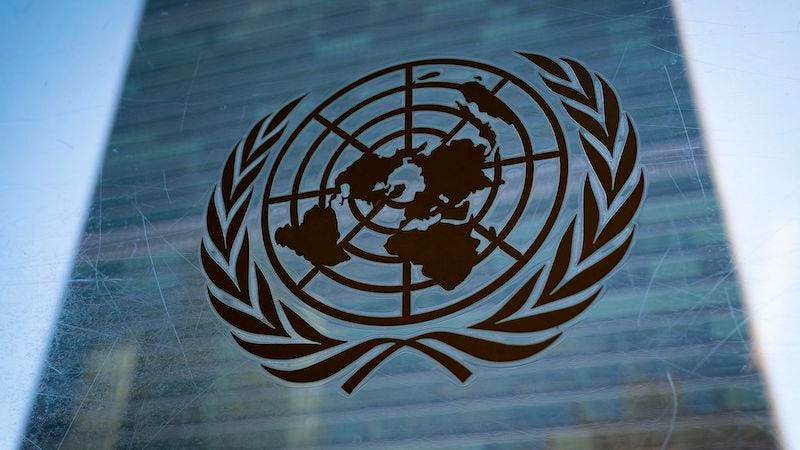UN vote on Palestine exposes Albanese’s hypocrisy and Australia’s inconsistent foreign policy
Australia must take a more active and principled role in resolving the Israeli–Palestinian conflict, guided by a genuine commitment to human rights.
There was another vote at the United Nations on the weekend, aiming to provide Palestine with additional observer status rights. Unlike the vote in April, which the United States blocked through the UN Security Council, this time the draft resolution had undergone changes to address the previous objections. The revised vote was passed by the United Nations by a substantial majority of 143 votes to 9, despite the vehement protests from the Israeli Ambassador. Although this change was small, it signified progress in the pathway for Palestine being fully recognised as a state. This vote did not concern full UN membership for Palestine, which typically involves a cyclical pattern of vetoes from permanent members of the United Nations—the United States vetoed the vote in April and is expected to do so again if a resolution for full Palestinian membership arises, and in the unlikely event that it did either support the vote or abstain, the permanent members usually conspire so that one of the other members—either Britain or France—can find some fault with the resolution, perpetuating the diplomatic stalemate.
Australia’s stance on this matter continues to highlight the inconsistency in its foreign policy regarding the Israeli–Palestinian conflict. The rhetoric of a two-state solution, frequently reiterated by Australian officials, rings hollow without recognising both Israel and Palestine as sovereign states. Australia’s abstention from the vote in April—to provide Palestine with full UN membership—reflects a lack of courage and commitment to meaningful progress in the region and while it did support this vote, it did it’s best to downplay the significance of this support, leaving people wondering why they supported it in the first place. Foreign Minister Penny Wong had been engaged in discussions with ministers from Germany, the United Arab Emirates, and New Zealand, yet substantial political will is still lacking. In an election year for the United States and Britain—and possibly Australia—these countries are unlikely to shift their positions, further complicating efforts for change.
Comparisons have been also been made between the situation in Palestine and the historical context of East Timor in 1999. Indonesia’s long-standing control over East Timor, driven by strategic interests in the region’s resources, seemed intractable until international pressure and political will culminated in an end to the Indonesian occupation and East Timor’s independence in 2002. While each international situation is unique, there are lessons to be learned from East Timor that could be applied to Palestine and the broader Middle East. However, this requires a significant shift in political will from the international community, which is currently absent concerning Gaza and Palestine.
Australia’s involvement in East Timor was also marred by controversial actions, including the disproportionate appropriation of gas resources and allegations of spying on the East Timorese government. These actions highlights the importance of supporting smaller nations rather than exploiting them, a lesson that seems not fully absorbed when it comes to Gaza. The ongoing reluctance to join the global consensus in protecting Palestinian rights and sovereignty reflects a persistent failure in Australian foreign policy. This failure is particularly stark given the context of Palestinian resistance against what they view as foreign interlopers taking their land, especially when consideration of Australia engaged in exactly the same action in 1788 which its own Indigenous population. It is crucial for Australia, and the international community, to engage in self-reflection and adopt a more just and proactive stance on Palestine.
Debate over Palestinian statehood highlights hypocrisy and inaction in Australian foreign policy
The ongoing debate over what constitutes a Palestinian state has also dominated international discussions recently. Central to this debate is whether the borders should be based on the pre-1967 lines or include Gaza and the current West Bank, which has been increasingly encroached upon by illegal Jewish settlements over the past 57 years. The pre-1967 borders are unequivocally unacceptable to the current Israeli leadership. Yet, it’s crucial to acknowledge that, as a state founded on Zionism, Israel is unlikely to ever accept the establishment of any kind Palestinian state, irrespective of how small it is. Consequently, any vote on the state of Palestine is improbable to succeed in the near term, especially during an election year in the United States. Australia, with an election looming possibly by the end of this year or by May 2025, is likely to maintain its pro-Israel stance under Prime Minister Anthony Albanese’s government.
Albanese’s recent actions starkly contradict his positions when he was in opposition. This perspective was evident in his conversation with former Liberal Party treasurer Josh Frydenberg—who appears to be revelling in role of director of pro-Israel propaganda documentaries for Sky News—when Frydenberg asked Albanese if the phrase “from the river to the sea” extremely violent and said it had no place on Australian streets, Albanese readily agreed. And to further show which side he now supports, in a recent 3AW interview when asked to comment on the pro-Palestine university protests and encampments, Albanese said “I reckon if you asked those people chanting it [from the river to the sea], heaps of them wouldn’t have a clue, wouldn’t be able to find the [river] Jordan on a map”. Not much solidarity with the people who Albanese would have been protesting with on campus, in his previous life in student politics. But, as Lord Action once said “power tends to corrupt and absolute power corrupts absolutely”.
This stance raises questions about the perceived violence of words versus actions. While the phrase is deemed offensive and violent towards Israelis, the massacre and bombing of over 35,000 Palestinians, predominantly women and children, is not similarly condemned by these leaders. This selective outrage reflects a profound hypocrisy. Frydenberg, Albanese and many other leaders seem to overlook the equally inflammatory and violent rhetoric from Israeli leaders. Not long ago, Israeli Prime Minister Benjamin Netanyahu asserted that Israel must control the entire area “from the river to the sea”—so, it seems, words are deemed violent and unacceptable if uttered by Palestinians, but appear to be ignored when the same words come from an Israeli leader.
The double standard extends further. Albanese recently reprimanded Education Minister Jason Clare for his balanced stance on protests and slogans, where Clare emphasised that while protests are a fundamental part of democracy, there is no place for hate, prejudice, discrimination, intimidation, anti-Semitism, or Islamophobia, and pointed out the ambiguous interpretation of slogans like “from the river to the sea," which have been used by both Palestinian advocates and Israeli political parties. Clare’s call for a two-state solution, where two peoples could live side by side in peace without fear, terrorism, checkpoints, or occupation, was a plea for reason and balance. Yet, Clare’s very moderate comments and statements on Israel were shut down by Albanese, and criticised as being highly inflammatory and anti-Semitic by the Israel and Zionist lobby groups, and News Corporation.
This hypocrisy is stark. The selective condemnation of rhetoric depending on its source highlights a broader issue in international politics regarding Palestine. The same words are branded as violent when spoken by Palestinians but are brushed off when articulated by Israeli officials. This double standard not only undermines the legitimacy of calls for peace and justice but also perpetuates the cycle of violence and occupation in the region. Albanese’s shift in stance from opposition to leadership further exemplifies the political expediency that often trumps genuine efforts towards a fair resolution of the Israeli-Palestinian conflict.
Australia’s lack of action and the inconsistency in its foreign policy reflect a broader unwillingness to confront the complex realities of the Israeli–Palestinian conflict. This reluctance to take a firm and principled stand, whether driven by electoral considerations or international alliances, ultimately contributes to the ongoing suffering and instability in the region. It is imperative for leaders to transcend partisan politics and adopt a genuinely balanced approach that advocates for the rights and sovereignty of all peoples involved.
Albanese’s shifting stance on Palestine undermines his credibility
Albanese’s stance on Palestine presents a troubling inconsistency that has become increasingly evident over his tenure. While Albanese has shown strong leadership on various issues, his approach to the Israeli–Palestinian conflict starkly contrasts with his earlier, more principled positions. True leadership entails adhering to values consistently, and deviating from these values can erode a leader’s credibility over time. This divergence is particularly glaring given Albanese’s history of pro-Palestinian advocacy and other issues, such as his previous support for increasing social welfare payments. His current positions not only diminishes his moral authority but also raises questions about his commitment to justice and human rights.
Albanese’s shift on Palestine, alongside his reluctance to support raising Jobseeker payments, marks a significant departure from his past advocacy and this change reflects a broader trend in politics where electoral calculations often outweigh moral imperatives, and it’s a pragmatic but ethically dubious approach, especially given the ongoing humanitarian crisis in Gaza. As reports of massacres and uncovered mass graves continue to emerge, Albanese’s support for Israel becomes increasingly indefensible. Certainly, the electorate may not prioritise Middle Eastern policy in their voting decisions on election day, and this is a calculation that both Albanese and U.S. President Joe Biden are relying on. However, dismissing the ethical and moral dimensions of the Gaza conflict undermines the very principles that should guide leadership.
When leaders abandon long-held beliefs, they need compelling reasons for doing so. In the case of Albanese, such reasons have not been convincingly presented. He was pro-Palestine when he was was opposition but now that he’s a leader of government, he’s pro-Israel and dismissive of any calls for action on alleviating the situation for the people of Gaza. This lack of transparency and deviation from core values is troubling. The government must rediscover its soul, purpose, and reason for being. Albanese’s leadership on this issue—or lack thereof—demands a re-evaluation of priorities, guided by the principles of justice, equality, and human rights.
The ongoing developments at the United Nations regarding Palestine highlight the need for strong, principled international leadership. Australia’s failure to take a decisive stand on this issue reflects broader systemic problems in how foreign policy is conducted. The hypocrisy in supporting Israel despite the clear humanitarian crisis in Gaza cannot be justified by electoral pragmatism alone. Leaders must be held accountable for their actions and the values they espouse.
True leadership requires unwavering commitment to one’s values, especially in the face of complex international issues. Albanese’s shifting stance on Palestine not only undermines his credibility but also reflects a deeper problem within political leadership today. The international community, including Australia, must take a more active and principled role in resolving the Israeli–Palestinian conflict, guided by a genuine commitment to human rights and justice for all.











Hi Eddy and David, I think you’ve nailed it with comparisons between Albanese’s beliefs while in opposition and his beliefs now, especially regarding Israel/Palestine and JobKeeper. It’s hard to work out which beliefs are his real ones. I would hope that his core beliefs are those he showed when in opposition, but I would like to know what has ‘corrupted’ them. So disappointing.